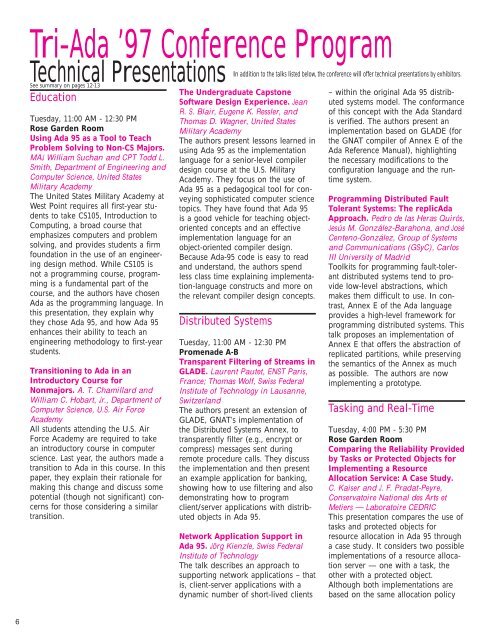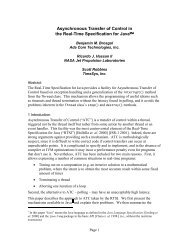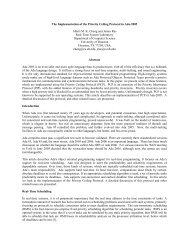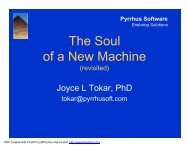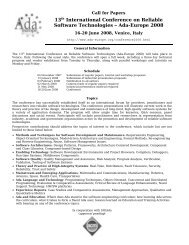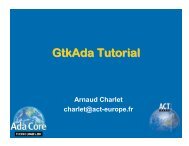AP 20 Pages-rc (Page 1) - SIGAda
AP 20 Pages-rc (Page 1) - SIGAda
AP 20 Pages-rc (Page 1) - SIGAda
Create successful ePaper yourself
Turn your PDF publications into a flip-book with our unique Google optimized e-Paper software.
Tri-Ada ’97 Conference Program<br />
Technical Presentations<br />
See summary on pages 12-13<br />
Education<br />
Tuesday, 11:00 AM - 12:30 PM<br />
Rose Garden Room<br />
Using Ada 95 as a Tool to Teach<br />
Problem Solving to Non-CS Majors.<br />
MAJ William Suchan and CPT Todd L.<br />
Smith, Department of Engineering and<br />
Computer Science, United States<br />
Military Academy<br />
The United States Military Academy at<br />
West Point requires all first-year students<br />
to take CS105, Introduction to<br />
Computing, a broad course that<br />
emphasizes computers and problem<br />
solving, and provides students a firm<br />
foundation in the use of an engineering<br />
design method. While CS105 is<br />
not a programming course, programming<br />
is a fundamental part of the<br />
course, and the authors have chosen<br />
Ada as the programming language. In<br />
this presentation, they explain why<br />
they chose Ada 95, and how Ada 95<br />
enhances their ability to teach an<br />
engineering methodology to first-year<br />
students.<br />
Transitioning to Ada in an<br />
Introductory Course for<br />
Nonmajors. A. T. Chamillard and<br />
William C. Hobart, Jr., Department of<br />
Computer Science, U.S. Air Fo<strong>rc</strong>e<br />
Academy<br />
All students attending the U.S. Air<br />
Fo<strong>rc</strong>e Academy are required to take<br />
an introductory course in computer<br />
science. Last year, the authors made a<br />
transition to Ada in this course. In this<br />
paper, they explain their rationale for<br />
making this change and discuss some<br />
potential (though not significant) concerns<br />
for those considering a similar<br />
transition.<br />
The Undergraduate Capstone<br />
Software Design Experience. Jean<br />
R. S. Blair, Eugene K. Ressler, and<br />
Thomas D. Wagner, United States<br />
Military Academy<br />
The authors present lessons learned in<br />
using Ada 95 as the implementation<br />
language for a senior-level compiler<br />
design course at the U.S. Military<br />
Academy. They focus on the use of<br />
Ada 95 as a pedagogical tool for conveying<br />
sophisticated computer science<br />
topics. They have found that Ada 95<br />
is a good vehicle for teaching objectoriented<br />
concepts and an effective<br />
implementation language for an<br />
object-oriented compiler design.<br />
Because Ada-95 code is easy to read<br />
and understand, the authors spend<br />
less class time explaining implementation-language<br />
constructs and more on<br />
the relevant compiler design concepts.<br />
Distributed Systems<br />
In addition to the talks listed below, the conference will offer technical presentations by exhibitors.<br />
Tuesday, 11:00 AM - 12:30 PM<br />
Promenade A-B<br />
Transparent Filtering of Streams in<br />
GLADE. Laurent Pautet, ENST Paris,<br />
France; Thomas Wolf, Swiss Federal<br />
Institute of Technology in Lausanne,<br />
Switzerland<br />
The authors present an extension of<br />
GLADE, GNAT’s implementation of<br />
the Distributed Systems Annex, to<br />
transparently filter (e.g., encrypt or<br />
compress) messages sent during<br />
remote procedure calls. They discuss<br />
the implementation and then present<br />
an example application for banking,<br />
showing how to use filtering and also<br />
demonstrating how to program<br />
client/server applications with distributed<br />
objects in Ada 95.<br />
Network Application Support in<br />
Ada 95. Jörg Kienzle, Swiss Federal<br />
Institute of Technology<br />
The talk describes an approach to<br />
supporting network applications – that<br />
is, client-server applications with a<br />
dynamic number of short-lived clients<br />
– within the original Ada 95 distributed<br />
systems model. The conformance<br />
of this concept with the Ada Standard<br />
is verified. The authors present an<br />
implementation based on GLADE (for<br />
the GNAT compiler of Annex E of the<br />
Ada Reference Manual), highlighting<br />
the necessary modifications to the<br />
configuration language and the runtime<br />
system.<br />
Programming Distributed Fault<br />
Tolerant Systems: The replicAda<br />
Approach. Pedro de las Heras Quirós,<br />
Jesús M. González-Barahona, and José<br />
Centeno-González, Group of Systems<br />
and Communications (GSyC), Carlos<br />
III University of Madrid<br />
Toolkits for programming fault-tolerant<br />
distributed systems tend to provide<br />
low-level abstractions, which<br />
makes them difficult to use. In contrast,<br />
Annex E of the Ada language<br />
provides a high-level framework for<br />
programming distributed systems. This<br />
talk proposes an implementation of<br />
Annex E that offers the abstraction of<br />
replicated partitions, while preserving<br />
the semantics of the Annex as much<br />
as possible. The authors are now<br />
implementing a prototype.<br />
Tasking and Real-Time<br />
Tuesday, 4:00 PM - 5:30 PM<br />
Rose Garden Room<br />
Comparing the Reliability Provided<br />
by Tasks or Protected Objects for<br />
Implementing a Resou<strong>rc</strong>e<br />
Allocation Service: A Case Study.<br />
C. Kaiser and J. F. Pradat-Peyre,<br />
Conservatoire National des Arts et<br />
Metiers — Laboratoire CEDRIC<br />
This presentation compares the use of<br />
tasks and protected objects for<br />
resou<strong>rc</strong>e allocation in Ada 95 through<br />
a case study. It considers two possible<br />
implementations of a resou<strong>rc</strong>e allocation<br />
server — one with a task, the<br />
other with a protected object.<br />
Although both implementations are<br />
based on the same allocation policy<br />
6


